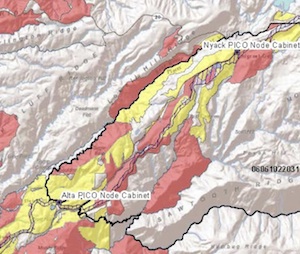
Click for all the maps.
Inyo Networks – one of the companies behind the Digital 395 network that serves the eastern side of the Sierra Nevada – is asking the California Public Utilities Commission for a $3.7 million subsidy to build access nodes along an existing fiber route that runs between Reno and Sacramento, more or less down the I-80 corridor, and includes a spur that connects the system to the Tahoe basin. The project was developed with considerable help from the Tahoe area’s broadband consortium. It’s the second application the company has submitted recently for a grant from California Advanced Services Fund – the first was for fiber-to-the-home service in Inyo County.
The Trans-Sierra proposal is primarily a middle mile project, but it also includes last mile, fiber-to-the-home service in two small communities – Nyack and Emigrant Gap – along the way. It would connect the Reno end of the Digital 395 system to major Internet exchange points in Sacramento, and make it possible to cross-connect to the Central Valley Independent Network, another CASF-subsidised (and federal stimulus program-subsidised) middle mile project that runs north and south through the foothills on the western side of the Sierra.
According to the project summary…
The proposed technology solution selected for the interoffice transport network is a series of four optical packet transport nodes located along the route at Sacramento, Auburn, Truckee and Reno. Capable of supporting multiple 100 Gb. wavelengths, the transport nodes will be equipped with reconfigurable optical add drop multiplexers (ROADM) that will provide access for OTN level interconnection switching to other middle mile networks and local distribution facilities. In addition, at the Truckee and Auburn nodes, Ethernet interfaces in 1 and 10 Gb capacity increments will support five, fiber fed, pico node cabinets that are proposed for Applegate, Weimar, Nyack, Colfax, and Alta. Those pico node cabinets will act as interconnection points for local service provider last mile distribution facilities.
Total cost is pegged at $6.1 million; the ask is for a 60% subsidy.
Tellus Venture Associates is assisting Inyo Networks with this project, on behalf of the CPUC-funded Tahoe Basin broadband consortium. I am not a disinterested commentator. Take it for what it’s worth.
